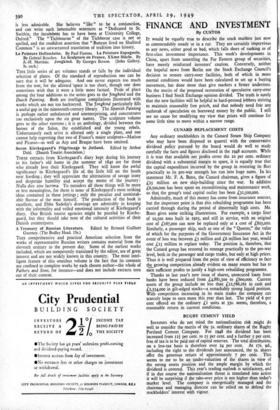FINANCE AND INVESTMENT
By CUSI'OS
IT would be equally true to describe the stock markets just now as commendably steady or in a rut. They are certainly impervious to any news, either good or bad, which falls short of ranking as of first-class investment importance. This week's developments in China, apart from unsettling the Far Eastern group of securities, have merely reinforced investors' caution. Conversely, neither the hopeful news from Berlin nor the Stock Exchange Council's decision to restore carry-over facilities, both of which in more normal conditions would have been calculated to set up a buying movement, has done more than give markets a firmer undertone. On the merits of the'proposed restoration of speculative carry-over business I find Stock Exchange opinion divided. The truth is surely that the new facilities will be helpful to hard-pressed jobbers striving to maintain reasonably free prices, and that nobody need fear any outbreak of speculation on borrowed money by the public. I still see no cause for modifying my view that prices will continue for some little time to move within a narrow range.
CUNARD REPLACEMENT COSTS
Any ordinary stockholders in the Cunard Steam Ship Company who may have been disposed to quarrel with the conservative dividend policy pursued by the board would do well to study carefully the facts and figures disclosed in the 1948 accounts. 'While it is true that available net profits cover the to per cent. ordinary dividend with a substantial margin to spare, it is equally true that the capital expenditure incurred by the group in restoring its fleet practically to its pre-war strength has run into huge sums. In his statement Mr. F. A. Bates, the Cunard chairman, gives a figure of £25 million on new ship-building since the war. In addition £6,500;000 has been spent on reconditioning and maintenance work, so that the group's total capital outlay has been £31,500,000.
Admittedly, much of this money has come from insurance sources, but the important point is that this rebuilding programme has been carried through during the period of abnormally high costs. Ma. Bates gives some striking illustrations. For example, a cargo liner of to,5oo tons built in 1925, and still in service, with an original cost of £167,00o can now be replaced only at a cost of £625,000. Similarly, a passenger ship, such as one of the " Queens," the value of which for the purposes of the Government Insurance Act in the event of loss was between £5 million and £6 million last year, would cost £ts million to replace today. The position is, therefore, that the Cunard group has restored its tonnage practically to the pre-war level, both in the passenger and cargo trades, but only at high prices. Thus it is well prepared from the point of view of efficiency to face the growing competition already evident on many routes but has to earn sufficient profits to justify a high-cost rebuilding programme.
Thanks to last year's new issue of shares, unsecured loans from banks have been reduced from £4,881,300 to £600,000. Current assets of the group include no less than £12,786,261 in cash and £2,334,000 in gilt-edged stocks—a remarkably strong liquid position. With competition increasing in its main trades the company can scarcely hope to earn more this year than last. The yield of 6 per cent offered on the ordinary £i units at 33s. seems, therefore, a reasonable return in current conditions.
RUGBY CEMENT YIELD
Investors who do not mind the nationalisation risk might do well to consider the-merits of the 5s. ordinary shares of the Rugby Portland Cement Company. For 1948 the dividend has been increased from I21 per cent. to If per cent. and a further 5 per cent. free of tax is to be paid out of capital reserves. The total distribution, on a less-tax basis is therefore over 24 per cent. At 17s. 9d., including the right to the dividends just announced, the 5s. shares offer the generous return of approximately 7 per cent. This seems to me to be an under-valuation of the shares in view of the strong assets position and the ample margin by which the dividend is covered. This year's trading outlook is satisfactory, and if in due course the nationalisation threat is translated into action it will be surprising if the take-over price is not higher than today's market level. The company is energetically managed and the chairman and managing director can be relied on to defend the stockholders' interest with vigour.


































 Previous page
Previous page